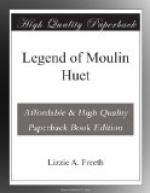When Hirzel and his sister were out of sight, Jacques got down from his hiding place and walked after them with the intention of telling old Pierre what he had heard, and also to reveal to him a plan which had suggested itself to his evil mind for destroying the young soldier when he came to visit Marguerite on the following Wednesday evening. Jacques changed his mind about going in when he came near the mill. He saw through the open door Pierre talking with his children; he thought he should not be able to see the old man alone that night, and besides, he had a feeling which kept him back from entering Marguerite’s presence when he was plotting against her happiness in such a deadly manner. So Gaultier turned his steps homeward, revolving in his mind the plan he had laid out which was briefly this. The mill wheel was secured by a rope which passed round the corner of the house and into a room behind the granary, where it was fastened to a rafter. Now Gaultier thought that when Charlie was standing on the wheel, if he could get old Pierre to unfasten the rope, the sudden starting round of the wheel would precipiate Charlie into the stream below, where he must inevitably be dashed to pieces. Well thought of, Jacques Gaultier; but it is a pity thy ingenuity had not been turned to better account!
Jacques spent a most restless night, for the awfulness of the crime which he was meditating presented itself unceasingly to his mind; but, on the other hand, he pictured to himself Marguerite Charlie’s wife, therefore lost to him. Not only did he hate Charlie on this score, but political feeling, as well as the frank pleasant manner of the young soldier, assisted in making Jacques look hardly on him. He could’nt but remark the different manner in which he was treated. People rather avoided than courted the society of “Dark Jacques Gaultier,” as he was called by the boys round his neighbourhood, with the disagreeable honesty of “small boy” youth.
Jacques was one of those unhappy beings who live with their blinds down and windows shut, morally speaking; and yet who wonder that they don’t get the bright light and pure air into their minds, which cause some of their brethren to be such refreshing bits in the way through life. One of these was Charlie: he went happily through life, carrying sunshine with him wherever he went: he felt sorry for Jacques, and would willingly have been friends with him, but in their relative positions this was impossible. All his overtures were received with decided rudeness on the part of Jacques, when they received any notice at all, so Charlie gave up, and took the situation as inevitable. When morning came Jacques rose very early and went down to the mill. He judged the early morning to be the best time to see the old man by himself. In this he was correct, for when he got there he found Pierre was the only one down. He was standing in the little garden in the front of the house. After they had exchanged the customary greetings of the place, the old miller asked Jacques “what had brought him out so early.”




